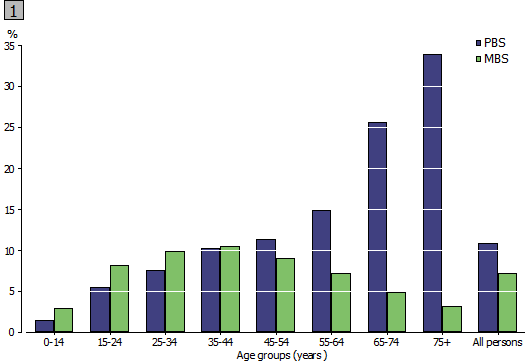INTRODUCTION
The Mental Health Services-Census Data Integration project brings together for the first time the breadth of the 2011 Census data with administrative information on people accessing subsidised mental health-related Medicare Benefits Schedule (MBS) services and Pharmaceutical Benefits Scheme (PBS) prescription medication.
This project was initiated on behalf of the National Mental Health Commission (NMHC) with the aim of informing the National Review of Mental Health Services and Programmes (the Review). The focus of the Review is to 'assess the efficiency and effectiveness of programmes and services in supporting individuals experiencing mental ill health and their families and other support people to lead a contributing life and to engage productively in the community' (Endnote 1).
Integrating a selected subset of data items from the Medical Benefits Schedule (MBS), Pharmaceutical Benefits Scheme (PBS) and the 2011 Census of Population and Housing (Census) has greatly increased the power of the data to support analysis of the circumstances and characteristics of people experiencing mental ill-health as they interact with the health care system. The Mental Health Services-Census Integrated Dataset includes people who responded to the 2011 Census and those who accessed subsidised mental health-related items listed on the MBS or PBS in 2011. For more information on these datasets, see Explanatory notes.
This project will contribute significantly to the pool of mental health-related data available in Australia to assist in the development and evaluation of mental health programs and support services now and into the future. Questions can be answered about people accessing subsidised mental health-related services and medications with evidence that up until now has not been available. For example, analysis of the integrated data will answer questions about the relationship between mental health-related services, medication use, and key socio-economic information such as education, employment and housing.
The confidentiality of these data are protected by the Census and Statistics Act (1905) and the Privacy Act (1988). MBS and PBS information provided by the Department of Health and the Department of Human Services to the ABS is treated in the strictest confidence as is required by the National Health Act (1953), and the Health Insurance Act (1973).
OVERVIEW
Good mental health is a crucial aspect of good general health, and underpins a productive and inclusive society. Mental health and illness result from the complex interplay of biological, social, psychological, environmental and economic factors at all levels (Endnote 2).
The information in this publication relates to people who actually accessed either an MBS mental health-related service or a PBS subsidised medication in 2011. (For more information, please refer to the Explanatory Notes). As the following graph shows, the age structure of these two groups was quite different.
Graph 1 shows the proportion of the population in each age group that accessed a subsidised mental health-related service or medication in 2011.
Graph 1: Proportion of Australian population who accessed subsidised mental health-related MBS services and PBS medication -- 2011, by Age

The proportion of the population accessing PBS subsidised mental health-related prescription medications increased with age, with over one-third (34%) of all people aged 75 years and over accessing one or more of these drugs in 2011. By comparison, a higher proportion of people aged 15-64 years accessed MBS subsidised mental health-related services compared with people younger or older than this age group.
 Print Page
Print Page
 Print All
Print All